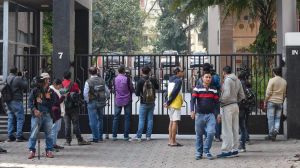Scrutinise SCB for forex violation
In a ruling that is set to bring foreign banks like the Standard Chartered Bank SCB under the scrutiny of enforcement directorate for fore...

In a ruling that is set to bring foreign banks like the Standard Chartered Bank SCB under the scrutiny of enforcement directorate for foreign exchange violations, the Supreme Court has upheld the validity of Sections 50 and 51 of the Foreign Exchange Regulation Act Fera and held that SCB and its officers have to face ED notices which could impose fine on them.
A three judge bench of Chief Justice of India CJI Y.K. Sabharwal, Justices C.K. Thakker and P.K. Balasubramanyan in a judgment dismissed an appeal of SCB and some of its officers contending that the provisions of Fera were 8216;unconstitutional8217; and that they should be struck down for hitting articles 14 Right to Equality and 21 Right to Life of the Constitution.
Justice Balasubramnayan writing the judgment for the bench said that the entire penalty for Fera violations could be recovered from the bank as well as its officers 8216;8216;incharge8217;8217; of a transaction 8216;8216;or those connived at or were instrumental in the contravention of the provisions of the Act8217;8217;.
The court reiterated that a company, in the instant case SCB, did not 8216;8216;enjoy any immunity from prosecution8217;8217; in respect of offences for which a mandatory punishment of imprisonment is prescribed.
ED had earlier issued notices to SCB and some of its officers to face adjudication proceedings under Sections 50 and 51 of Fera. Further notices were also sent under section 61 giving an opportunity to the bank and its officers to show that they had necessary permission for the foreing exchange transaction involved in the case. The bank and its officers assailed Sections 50, 51, 56 and 68 of Fera.
While upholding the validity of all the provisions, the Apex bench in its 54-page judgment pointed out that notice under Section 61 was 8216;merely notices of enquiry8217; giving an opportunity to the appellants to show that they had necessary permission from the concerned authority under Fera in respect of a particular transaction of foreign exchange.
The Apex bench also said that if the appellants SCB and its officers were not able to show any permission, complaints have to be filed before the concerned magistrate and arguments on behalf of the accused could be advanced in the criminal trial. 8216;8216;We see no justification for the issue of a wit of prohibition restraining the authority under Fera from proceeding further with the adjudication8217;8217; the Apex judges ruled making it clear that SCB and its officers have to face the adjudication.
- 01
- 02
- 03
- 04
- 05































